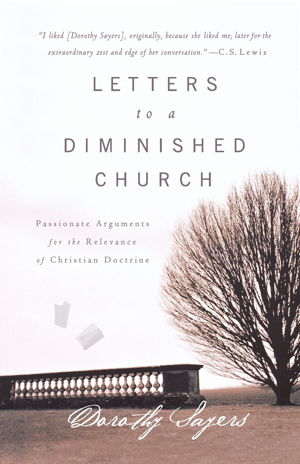
Interested in reading a woman apologist of C.S. Lewis’s caliber and era? Uncover Dorothy Sayers’ insights on Theology and Work from selected essays and discover the clarity and confidence with which she articulates Christian doctrine. We offer here the questions that guided our online book club on Letters to a Diminished Church.
Dorothy Sayers was one of the first women who graduated from Oxford University. She received first class honors for modern languages. She is the author of the delightful Lord Peter Wimsey series.
Creed or Chaos
1. Dorothy Sayers identifies seven fundamental aspects of doctrine that she feels that people in her day would be better off knowing accurately. Which aspects of these doctrines do you think people (either in society or the church) would be better off knowing accurately today? Why?
2. What aspects of the theology she describes resonates most with you and why?
3. For women: How comfortable are you — as a woman — to articulate sound doctrine in ways that are clear and confident? For men: How comfortable are you — as a man — to hear sound doctrine articulated clearly and confidently by a woman?
4. What thought or idea of Sayers' has taken a hold of you that you want to explore more?
The Triumph of Easter
1. Discussing evil, Sayers says that God is “working the pattern out” either with our cooperation (if we choose), or in spite of us (if we refuse to cooperate). What are some evils in our generation that God might be inviting you to cooperate on with him as he works on turning evil into good?
2. “God did not abolish the fact of evil. He transformed it. He did not stop the Crucifixion: He rose from the dead.” (pp. 114-115) Sharing is optional for the next two questions.
- In light of the Resurrection, what might be some “joyful activities” that God is calling you to walk in?
- What sin is he calling you to put behind you, rather than keep looking at in “morbid and egotistical remorse”?
Why Work?
1. What does Dorothy Sayers see in her society that spurs her to write about Work the way she does? Although we live in a very different era, are there any parallels to how our society thinks about work?
2. How do you respond to her thoughts about Work? What are ideas that particularly resonated with you?
3. Her theological emphasis in thinking about Work looks back at Creation and the fact that people are made in God’s image. Why do you think a Creation emphasis might have been important to her? Are you satisfied with her theological engagement?
4. Consider Sayers’ examples of the work of the carpenter and the angels in the play.
- Do you see your secular job as a sacred calling?
- What are some ways in which the work you do serves God?
- How does this affect the way you respond to requests to be more involved in church activities?
5. How can we help others (subordinates/juniors/students) find satisfaction in their work?
6. Sayers downplays the importance of "serving the community" with our work. She encourages "serving the work" instead. How do you react to this view?
The Dogma is the Drama
1. How can we display the divine drama (i.e. present and live out the orthodox Christian faith) in a manner that will “startle the world into some sort of vigorous reaction”?
We'd love to hear more about your book club! Let us know if you are using this guide — we'd love to pray for your meetings!